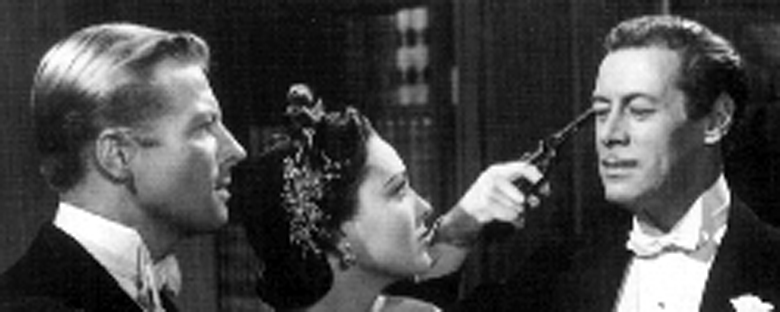Reviews
Preston Sturges
USA, 1948
Credits
Review by Beth Gilligan
Posted on 02 August 2005
Source The Criterion Collection DVD
Related articles
Unfaithfully Yours is a Preston Sturges film that doesn’t quite feel like a Preston Sturges film. Although the dialogue spouted by the characters bears his unmistakable stamp, the action that accompanies it is hardly the antic, stinging, sidesplitting satire that the writer-director’s audiences may be accustomed to. In addition, the lead character is a pompous British orchestra conductor played by Rex Harrison, a far cry from the hapless all-American sad-sacks played by Henry Fonda and Eddie Bracken in films such as The Lady Eve, Hail the Conquering Hero and The Miracle of Morgan’s Creek. Harrison’s female counterpart, in exchange for the feisty firebrands who populate the rest of Sturges’ oeuvre, is a bland and passive Linda Darnell.
Still, for all these differences, the film is richer than it’s often given credit for. The plot revolves around temperamental “genius” conductor Sir Alfred, who is rapturously in love with his beautiful young wife Daphne. Daphne, by all appearances, shares this sentiment, but her husband’s jealousy is piqued after his meddling brother-in-law August reveals he hired a private detective to track Daphne’s whereabouts while Sir Alfred was away. (Although Sir Alfred had, in fact, asked August to keep an eye on her during his travels, he never intended this favor to be interpreted in such a literal sense.) Furious at August’s presumptuousness, Sir Alfred sets fire to the report without even glancing at it, and marches into the detective’s office to destroy the remaining copies. As he is doing so, however, the detective innocently remarks that Daphne’s nighttime visit to Alfred’s handsome young male assistant’s suite doesn’t necessarily mean the two are having an affair. Startled by this revelation, Sir Alfred staggers into the concert hall, and as he is conducting the orchestra, begins to concoct three very different scenarios for confronting Daphne, one of which involves murder.
The interludes, which take place inside Sir Alfred’s head, are among the film’s most frequently misinterpreted passages. The acting is highly melodramatic, the camera moves less, and the lighting markedly changes. While some have been inclined to see this as a sign of Sturges’ slipping talents as a director (he would only go on to direct two more films after this, both of which were colossal flops), they were actually a conscious decision on his part (or so he claimed in his autobiography) to convey events as his protagonist might have imagined them unfolding. Darnell, who barely registers throughout the rest of the picture, seizes upon the opportunity to do some marvelous overacting here.
Unfaithfully Yours also stands out in the context of Sturges’ career as one of the few pieces that directly reflects his bohemian upbringing in Europe. Dragged across the continent by his arts-loving mother and her best friend, Isadora Duncan, Sturges simultaneously absorbed all the highbrow culture that was being flung at him and developed a distaste for it (years later, he wrote, “When I look back over what I was exposed to as a child, I realize how extraordinarily lucky I was never to have become a [God forbid] male interpretive dancer with a wreath of gold laurel leaves around my head.”) This convergence of tastes is reflected in all of his films, but is best represented here by the character of the private detective, a tough, presumably working-class fellow who turns out to be a great fan of classical music, enthusing to Sir Alfred, “You handle Handel like nobody handles Handel. And your Delius — delirious!”
Ultimately, Sturges’ precarious mixture of slapstick and pitch-black comedy proved a failure at the box office, though a torrent of bad publicity about Rex Harrison’s personal life and the studio’s decision to market the film as a murder mystery may well have played into this. Sturges took things even further in his memoirs, when he wrote, “The audiences laughed from the beginning to the end of the picture. And they went home with nothing. Because nothing had happened.” Yet if this is the case, it seems there’s much to be said for a whole lot of nothing.
We don’t do comments anymore, but you may contact us here or find us on Twitter or Facebook.



